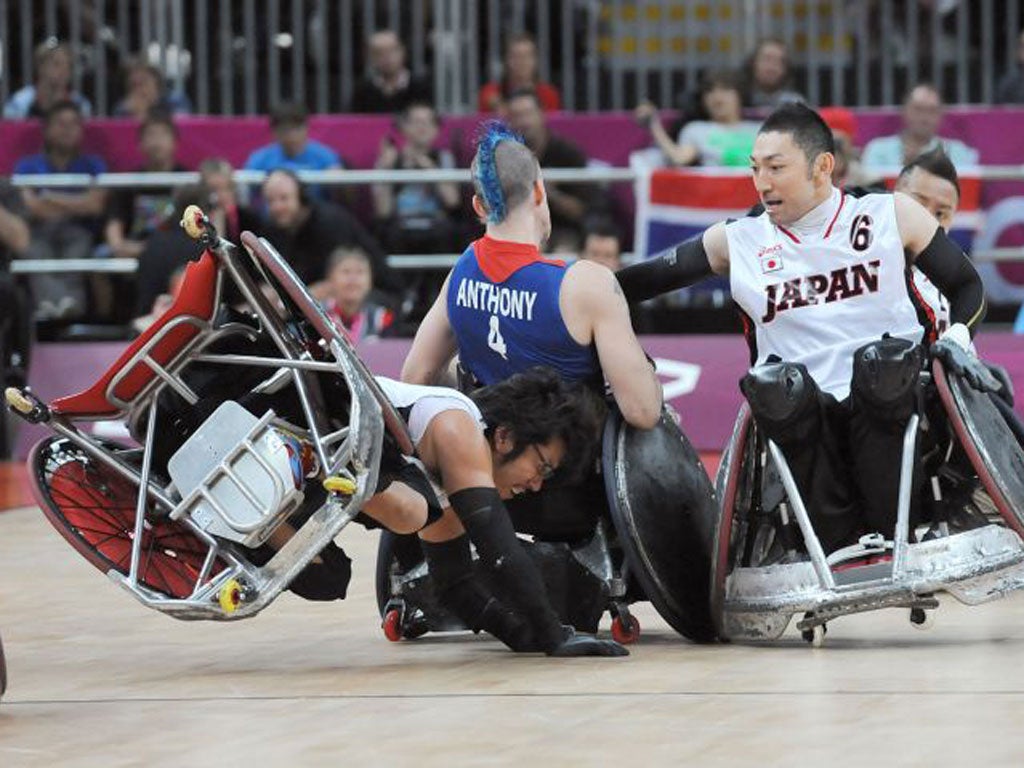Wheelchair rugby: The big hit of the Games – so will it take over the playgrounds?
Plan to allow able-bodied children to take part in the sport has sparked debate

Crash, bang, wallop. Coming to a school or youth club near you: murderball, the smash (quite literally) hit of the Paralympic Games.
The organisers of wheelchair rugby, now the sport's official name, plan to roll out a national youth programme next year subject to funding being secured with the long-term aim of developing the same number of competitive adult players as top ranked America and Australia.
Those nations have more than 3,000 players each. This country has barely a tenth of that number. When GB's battling bulldogs took on the US earlier this week they gave them a scare but the Americans' experience and depth took the game away late on.
At present, the game is reserved for quadriplegics. But GB Wheelchair Rugby's youth plan could involve opening up the game to able-bodied children as well as those with less serious disabilities.
But the organisers admit that there are mixed views on this – the sport owes its creation to a group of tetraplegic Canadians who, lacking the functionality to play wheelchair basketball, developed an alternative they could play.
David Pond, who heads the youth programme admitted: "We have to be cautious." But he added: "What we ought to be doing with young people is enabling opportunities for them to have fun in a chair. The truth is kids love the big bangs and we now have a couple of real characters to inspire them. David Anthony, the British player, with his blue Mohican. You should see the number of messages he's getting on Twitter. Then there's Kylie (Grimes), who has a massive female following."
It is not only the world of wheelchair rugby that is divided about whether to admit able-bodied participants. In wheelchair basketball, non-disabled people are barred at international level but play in other arenas, including Super League.
Stephanie Gagne, communications manager for GB Wheelchair Basketball, said there was little danger of able-bodied people taking over the sport because of its classification system, which ranks players from 1 to 5, with able-bodied people the latter, based on level of disability. The maximum points total for the five players on the court is 14.
Ms Gagne said the thinking behind allowing able-bodied people to play is that: "It allows more teams to be able to field competitive teams, you have more players available. It also enables family and friends to play. It's a fantastic sport, we'd like everyone to try it."
But not everyone agrees. Some clubs – the London Titans for example – prefer to focus on disabled athletes. Their reasoning: sporting opportunities for disabled people are rather limited while the able-bodied have a plethora of options. It's a fair point.
By contrast, wheelchair rugby league, a newer sport than the "murderball" variant, that is modelled closely on the able-bodied game, actively encourages able-bodied participants to take to chairs. Below the elite level, wheelchair tennis pitches able-bodied players against wheelchair users without the former needing to be seated.
David Vellala, who coaches wheelchair tennis, said: "The able-bodied player gets one bounce and if you're in a chair you get two. That's it. I'm not playing top-rated players against each other, although Rafa Nadal has played with Esther Vergeer in a mixed- doubles event. Tennis is a social sport. The idea is that you are teaching a skill and the aim is to find the best in people."
Join our commenting forum
Join thought-provoking conversations, follow other Independent readers and see their replies
Comments
Bookmark popover
Removed from bookmarks